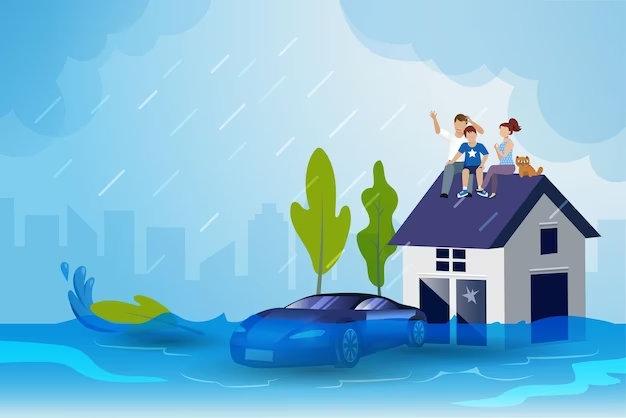Protect Yourself When You’re Stuck in a Flood
Being stuck in a Flood Prioritize your safety
Being stuck in a flood can be extremely dangerous, so it’s crucial to prioritize your safety. Here are some steps to protect yourself during a flood:
1. Stay informed: Pay attention to weather updates and warnings from local authorities. Follow the news and emergency alerts to stay informed about the flood situation and any evacuation orders.
2. Evacuate if advised: If authorities recommend evacuation, do not hesitate to leave the area immediately. Follow designated evacuation routes and go to higher ground or an emergency shelter.
3. Move to higher ground: If evacuation is not possible and you’re trapped in a flooded area, try to move to higher ground. Avoid basements and ground floors, as they are most susceptible to flooding.

4. Do not walk or drive through floodwaters: Floodwaters can be deceptively strong and can sweep you away or knock you off your feet. It takes only a few inches of fast-moving water to endanger your life. It is Better to Avoid walking or driving through flooded areas.
5. Avoid electrical hazards: Do not touch electrical appliances, outlets, or wires while standing in water or on wet surfaces. Electrical currents can travel through water and pose a significant risk of electrocution.
6. Boil water before use: If your water supply has been compromised by the flood, boil water before drinking or cooking to kill any potential contaminants.
7. Signal for help: If you are stranded and need assistance, use a flashlight or any other visible signal to attract the attention of rescue teams.
8. Listen to emergency services: Keep a battery-powered or hand-cranked radio to stay updated on emergency instructions and local rescue efforts.
9. Use life jackets: If you have access to life jackets, wear them to stay afloat in case you get into deep water.
10. Create a safety kit: Before a flood occurs, prepare an emergency kit with essential supplies, including non-perishable food, drinking water, first-aid supplies, a flashlight, extra batteries, a whistle, and any necessary medications.
11. Stay with others if possible: Stick together with family members, friends, or neighbors if you are unable to evacuate. It’s safer to have a support system during emergencies.
12. Avoid floodwaters, debris, and wildlife: Floodwaters can be contaminated and contain hazardous debris or wildlife. Stay away from these elements to avoid injury or infection.
Remember that the best way to protect yourself during a flood is to be prepared and evacuate to higher ground when advised. Always prioritize your safety and follow the guidance of local authorities during such emergencies.




